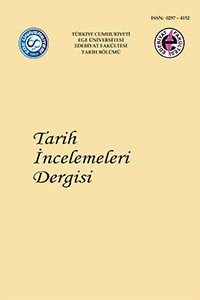Evil Be to Him Who Thinks Evil: Three Cases Of Swearing from İstanbul Court Registery in the Context of Gender Construction
Öz
We do not explicitly know why human beings show tendency to say swearwords. According to a common belief, they do so because of their hidden violent natures. Using swearwords against someone or something is mostly seen under the circumstances when a person can not harm physically his opponent. Thus he shows another sort of violence by his words. Even sometimes, swearing person aims at the most beloved people for his opponent and the harshness of his words may cause more damage than a physical attack on whom being swared. In the present day and society, most of people apply to the courts for being sweared by someone and demand compensation for his adversary. Nevertheless, one may see that it is not a new resort if he examines the Ottoman archival documents. In this paper, three different swearing cases in the Ottoman local courts shall be analyzed in the context of gender.
Anahtar Kelimeler
Kaynakça
- Allan ve Burridge 2006 Keith Allan ve Kate Burridge, Forbidden Words Taboo and the Censoring of Language. New York: Cambridge University Press.
- Altun (Öçkoymaz) 2010 Gülerdem Altun (Öçkoymaz), Hakaret Suçu (unprinted master thesis). Ankara: Ankara University, Institute of Social Sciences, Department of Criminal and Criminal Law of Method.
- Berger ve Luckmann 1991
- Peter L. Berger ve Thomas Luckmann, The Social Construction of Reality a Treatise in the Sociology of Knowledge. London: Penguin Books.
- Cebe 2011 Abdurrahman Cebe, Türk Ceza Kanununda Hakaret Suçu 5237 Sayılı Tür Ceza Kanunu Madde 125, 130 (unprinted master thesis). İstanbul: Bahçeşehir University, Institute of Social Sciences, Department of Public Law.
- Dewaele, 2004 Jean-Marc Dewaele, “The Emotional Force of Swearwords and Taboo Words in the Speech of Multilinguals”, Journal of Multilingual and Multicultural Development, vol: 25, no: 2&3, pp. 204-222.
- Erkek 2009 Mehmet Salih Erkek, “17. Yüzyılda Mardin Kadı Mahkemesine Yansıyan Küfür Davaları”, Acta Turcica, year: 1, no: 2/1, pp. 52-60.
Evil Be to Him Who Thinks Evil: Three Cases Of Swearing from İstanbul Court Registery in the Context of Gender Construction
Öz
We do not explicitly know why human beings show tendency to say swearwords. According to a common belief, they do so because of their hidden violent natures. Using swearwords against someone or something is mostly seen under the circumstances when a person can not harm physically his opponent. Thus he shows another sort of violence by his words. Even sometimes, swearing person aims at the most beloved people for his opponent and the harshness of his words may cause more damage than a physical attack on whom being swared. In the present day and society, most of people apply to the courts for being sweared by someone and demand compensation for his adversary. Nevertheless, one may see that it is not a new resort if he examines the Ottoman archival documents. In this paper, three different swearing cases in the Ottoman local courts shall be analyzed in the context of gender.
Anahtar Kelimeler
Kaynakça
- Allan ve Burridge 2006 Keith Allan ve Kate Burridge, Forbidden Words Taboo and the Censoring of Language. New York: Cambridge University Press.
- Altun (Öçkoymaz) 2010 Gülerdem Altun (Öçkoymaz), Hakaret Suçu (unprinted master thesis). Ankara: Ankara University, Institute of Social Sciences, Department of Criminal and Criminal Law of Method.
- Berger ve Luckmann 1991
- Peter L. Berger ve Thomas Luckmann, The Social Construction of Reality a Treatise in the Sociology of Knowledge. London: Penguin Books.
- Cebe 2011 Abdurrahman Cebe, Türk Ceza Kanununda Hakaret Suçu 5237 Sayılı Tür Ceza Kanunu Madde 125, 130 (unprinted master thesis). İstanbul: Bahçeşehir University, Institute of Social Sciences, Department of Public Law.
- Dewaele, 2004 Jean-Marc Dewaele, “The Emotional Force of Swearwords and Taboo Words in the Speech of Multilinguals”, Journal of Multilingual and Multicultural Development, vol: 25, no: 2&3, pp. 204-222.
- Erkek 2009 Mehmet Salih Erkek, “17. Yüzyılda Mardin Kadı Mahkemesine Yansıyan Küfür Davaları”, Acta Turcica, year: 1, no: 2/1, pp. 52-60.
Ayrıntılar
| Bölüm | MAKALELER |
|---|---|
| Yazarlar | |
| Yayımlanma Tarihi | 19 Aralık 2016 |
| Yayımlandığı Sayı | Yıl 2016 Cilt: 31 Sayı: 2 |


